- Clone
- JES3-9D7 (See other available formats)
- Regulatory Status
- RUO
- Other Names
- Interleukin-10, B cell derived T cell growth factor (B-TCGF), Cytokine synthesis inhibitory factor (CSIF), T-cell growth inhibitory factor (TGIF)
- Isotype
- Rat IgG1, κ
- Ave. Rating
- Submit a Review
- Product Citations
- publications
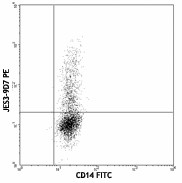
-

LPS-stimulated (20 hours) human monocytes were surface stained with CD14 FITC and then intracellular stained with JES3-9D7 PE
| Cat # | Size | Price | Save |
|---|---|---|---|
| 501403 | 25 tests | ¥22,880 | |
| 501404 | 100 tests | ¥53,680 |
IL-10 was originally described as Cytokine Synthesis Inhibitory Factor (CSIF) by virtue of its ability to inhibit cytokine production by Th1 clones. IL-10 shares over 80% sequence homology with the Epstein-Barr virus protein BCRFI. The biological activities of IL-10 include inhibition of macrophage-mediated cytokine synthesis, suppression of the delayed type hypersensitivity response, and stimulation of the Th2 cell response, which results in elevated antibody production.
Product DetailsProduct Details
- Verified Reactivity
- Human
- Reported Reactivity
- Baboon, Rhesus, Cynomolgus
- Antibody Type
- Monoclonal
- Host Species
- Rat
- Immunogen
- COS - expressed, recombinant human IL-10
- Formulation
- Phosphate-buffered solution, pH 7.2, containing 0.09% sodium azide and BSA (origin USA)
- Preparation
- The antibody was purified by affinity chromatography, and conjugated with PE under optimal conditions.
- Storage & Handling
- The antibody solution should be stored undiluted between 2°C and 8°C, and protected from prolonged exposure to light. Do not freeze.
- Application
-
ICFC - Quality tested
- Recommended Usage
-
Each lot of this antibody is quality control tested by intracellular immunofluorescent staining with flow cytometric analysis. For flow cytometric staining, the suggested use of this reagent is 5 µl per million cells in 100 µl staining volume or 5 µl per 100 µl of whole blood.
- Excitation Laser
-
Blue Laser (488 nm)
Green Laser (532 nm)/Yellow-Green Laser (561 nm)
- Application Notes
-
ELISA Capture1-5 or ELISPOT Capture6: The Ultra-LEAFpurified JES3-9D7 antibody is useful as the capture antibody in a sandwich ELISA, when used in conjunction with the biotinylated JES3-12G8 antibody (Cat. No. 501502) as the detecting antibody and recombinant human IL-10 (Cat. No. 571009) as the standard. The Ultra-LEAF™ purified antibody is suggested for ELISPOT capture.
Neutralization1-3,9: The Ultra-LEAF™ purified antibody (Endotoxin <0.1 EU/µg, Azide-Free, 0.2 µm filtered) is recommended for neutralization of human IL-10 bioactivity (Cat. Nos. 501427 & 501428). The JES3-9D7 antibody can neutralize the bioactivity of natural or recombinant IL-10.
Additional reported applications (for the relevant formats) include: immunohistochemical staining12.
Note: For testing human IL-10 in serum or plasma, BioLegend's ELISA Max™ Sets (Cat. Nos. 430601 & 430606) are specially developed and recommended.
The JES3-9D7 antibody reacts with human and viral interleukin-10 (IL-10). -
Application References
(PubMed link indicates BioLegend citation) -
- Abrams J, et al. 1992. Immunol. Rev. 127:5. (ELISA Capture, Neut)
- Gotlieb W, et al. 1992. Cytokine 4:385. (ELISA Capture, Neut)
- Yssel H, et al. 1992. J. Immunol. 149:2378. (ELISA Capture, Neut)
- Abrams J. 1995. Curr. Prot. Immunol. John Wiley and Sons New York. Unit 6.20. (ELISA Capture)
- Burdin N, et al. 1993. J. Exp. Med. 177:295. (ELISA Capture)
- Klinman D, et al. 1994. Curr. Prot. Immunol. John Wiley and Sons New York. Unit 6.19. (ELISPOT Capture)
- Schaerli P, et al. 2000. J. Exp. Med. 192:1553.
- Jason J, et al. 1999. Clin. Diagn. Lab Immunol. 6:73.
- Akdis CA, et al. 1998. J. Clin. Invest. 102:98. (Neut)
- Stary G, et al. 2011. J. Immunol. 186:103. PubMed
- Mason GM, et al. 2012. PNAS. PubMed
- 12. Smith DR, et al. 1994. Am. J. Pathol. 145:18. (IHC)
- Product Citations
-
- RRID
-
AB_315169 (BioLegend Cat. No. 501403)
AB_315170 (BioLegend Cat. No. 501404)
Antigen Details
- Structure
- Acid-labile cytokine, dimer, 35-40 kD (Mammalian)
- Bioactivity
- Inhibit IFN-γ, TNF-β, IL-2 production by TH1 clones; inhibits macrophage-mediated IL-1, IL-6, TNF-α synthesis; suppress delayed type hypersensitivity response; stimulate TH2 cell response; mast cell proliferation in
- Cell Sources
- Activated CD8+ and CD4+ T cells, activated monocytes, mast cells, Ly-1 B (mouse)
- Cell Targets
- T cells, B cells, mast cells, macrophages
- Receptors
- IL-10R (CDw210)
- Cell Type
- Tregs
- Biology Area
- Cell Biology, Immunology, Neuroinflammation, Neuroscience
- Molecular Family
- Cytokines/Chemokines
- Antigen References
-
1. Fitzgerald K, et al. Eds. 2001. The Cytokine FactsBook. Academic Press San Diego.
2. de Waal-Malefyt R, et al. 1992. Curr. Opin. Immunol. 4:314.
3. Howard M, et al. 1992. Immunol. Today. 13:198.
4. Quesniaux V. 1992. Research Immunol. 143:385. - Regulation
- Production inhibited by IL-4, IL-10
- Gene ID
- 3586 View all products for this Gene ID
- UniProt
- View information about IL-10 on UniProt.org
Related FAQs
- What type of PE do you use in your conjugates?
- We use R-PE in our conjugates.
Other Formats
View All IL-10 Reagents Request Custom Conjugation| Description | Clone | Applications |
|---|---|---|
| PE anti-human IL-10 | JES3-9D7 | ICFC |
| Purified anti-human IL-10 | JES3-9D7 | ELISA Capture,IHC-P,Neut |
| APC anti-human IL-10 | JES3-9D7 | ICFC |
| Alexa Fluor® 488 anti-human IL-10 | JES3-9D7 | ICFC |
| Alexa Fluor® 647 anti-human IL-10 | JES3-9D7 | ICFC |
| PE/Cyanine7 anti-human IL-10 | JES3-9D7 | ICFC |
| Brilliant Violet 421™ anti-human IL-10 | JES3-9D7 | ICFC |
| PerCP/Cyanine5.5 anti-human IL-10 | JES3-9D7 | ICFC |
| Purified anti-human IL-10 (Maxpar® Ready) | JES3-9D7 | ELISA Capture,CyTOF® |
| PE/Dazzle™ 594 anti-human IL-10 | JES3-9D7 | ICFC |
| Ultra-LEAF™ Purified anti-human IL-10 | JES3-9D7 | ELISA Capture,IHC-P,Neut |
| TotalSeq™-B1164 anti-human IL-10 | JES3-9D7 | ICPG |
| Brilliant Violet 785™ anti-human IL-10 | JES3-9D7 | ICFC |
| TotalSeq™-C1164 anti-human IL-10 | JES3-9D7 | ICPG |
Customers Also Purchased
Compare Data Across All Formats
This data display is provided for general comparisons between formats.
Your actual data may vary due to variations in samples, target cells, instruments and their settings, staining conditions, and other factors.
If you need assistance with selecting the best format contact our expert technical support team.
-
PE anti-human IL-10
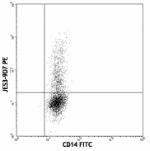
LPS-stimulated (20 hours) human monocytes were surface stain... -
Purified anti-human IL-10
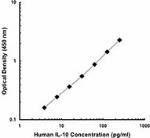
-
APC anti-human IL-10
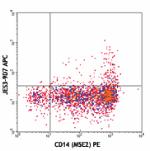
LPS-stimulated (overnight) human peripheral blood monocytes ... -
Alexa Fluor® 488 anti-human IL-10
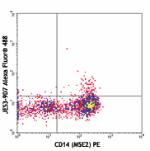
LPS-stimulated (overnight) human peripheral blood monocytes ... -
Alexa Fluor® 647 anti-human IL-10
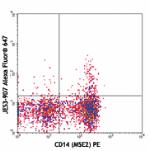
LPS-stimulated (overnight) human peripheral blood monocytes ... -
PE/Cyanine7 anti-human IL-10

LPS-stimulated (overnight) human peripheral blood mononuclea... -
Brilliant Violet 421™ anti-human IL-10
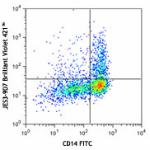
Human peripheral blood mononuclear cells were stimulated ove... 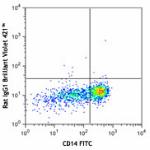
-
PerCP/Cyanine5.5 anti-human IL-10

Human peripheral blood mononuclear cells were stimulated ove... -
Purified anti-human IL-10 (Maxpar® Ready)
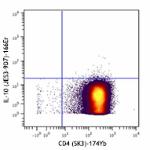
Human Th2-polarized CD4+ T cells were incubated for 5 hours ... 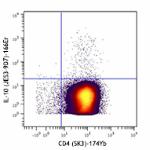
-
PE/Dazzle™ 594 anti-human IL-10
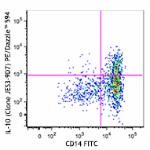
LPS-stimulated human peripheral blood mononuclear cells (in ... 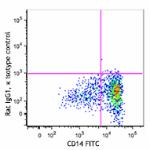
-
Ultra-LEAF™ Purified anti-human IL-10

-
TotalSeq™-B1164 anti-human IL-10

-
Brilliant Violet 785™ anti-human IL-10

LPS-stimulated human peripheral blood mononuclear cells (in ... -
TotalSeq™-C1164 anti-human IL-10











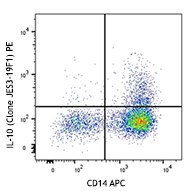
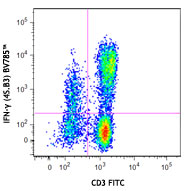
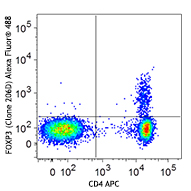
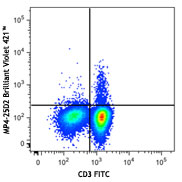



Follow Us